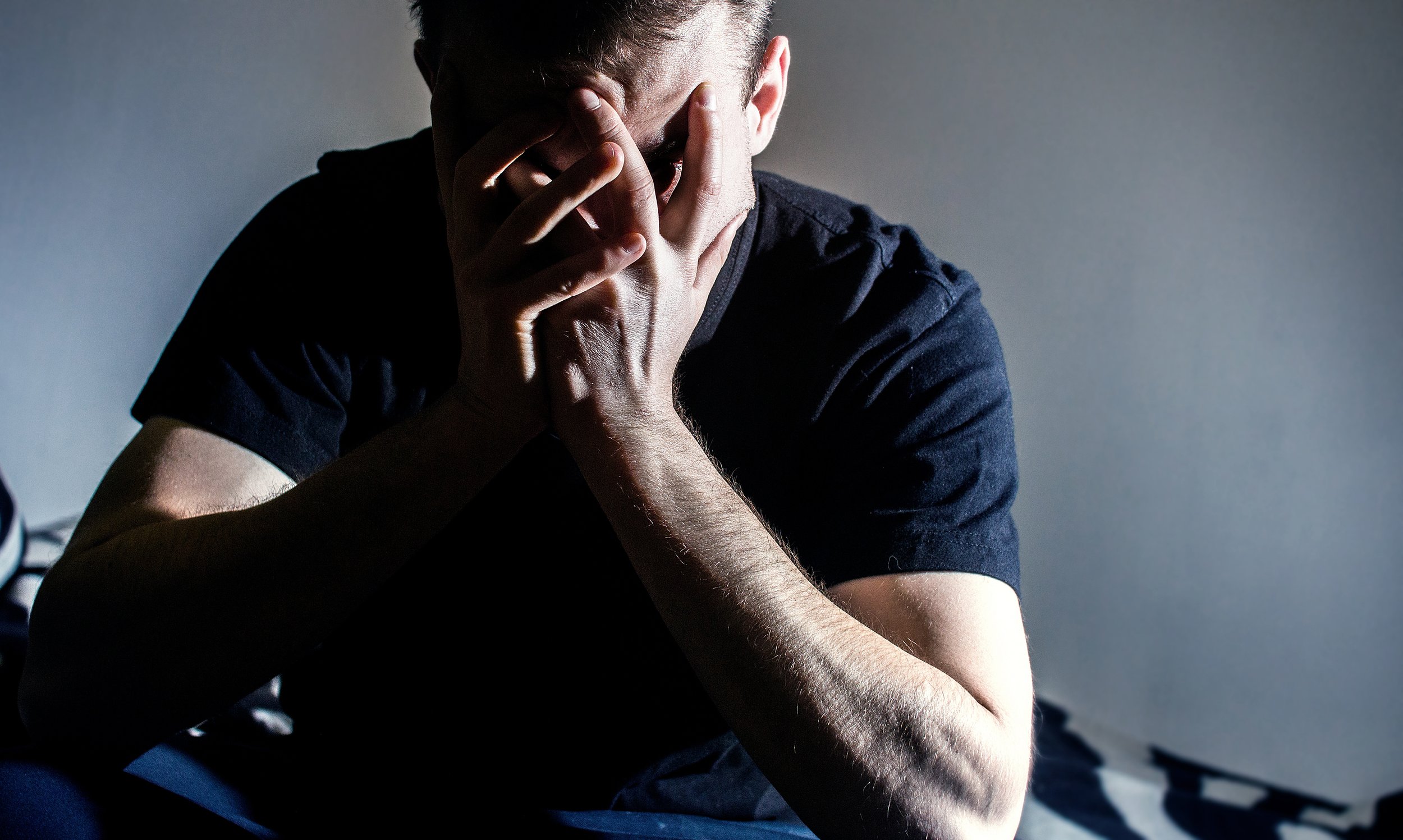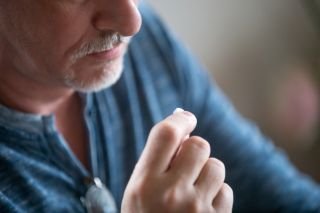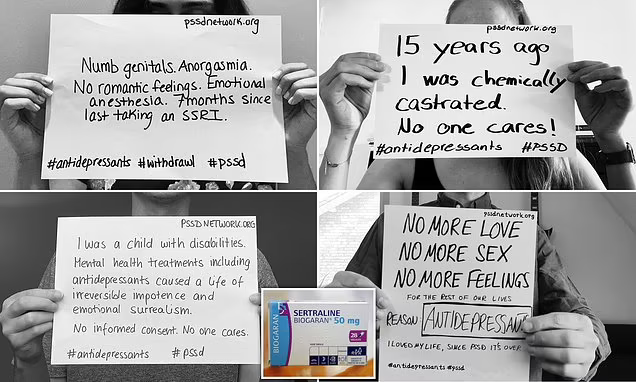The New York Times: After Antidepressants, a Loss of Sexuality
The article: “After Antidepressants, a Loss of Sexuality”, by Azeen Ghorayshi, discusses a group of patients experiencing severe sexual problems even after discontinuing the use of selective serotonin reuptake inhibitors (SSRIs), a common type of antidepressant. These long-term issues, known as Post-SSRI sexual dysfunction, include symptoms such as numb genitals and pleasureless orgasms. While some health authorities acknowledge these lasting effects, researchers are just beginning to quantify the prevalence of the condition.
Controversy exists among psychiatrists, with some attributing the problems to recurrent depression rather than the medications. The article highlights the need for further research and understanding, as well as concerns about potential impacts on prescribing these medications for mental health.
Bild: Charlotte Hasn’t Had Sex For 16 Years
The article “Charlotte Hasn’t Had Sex in 16 Years” by Karsten Kehr highlights the past 16 years of suffering from a PSSD sufferer in Germany. “I’m a switched off zombie” Charlotte says as she describes her experience and never-ending battle with the condition.
Daily Mail: “I’ve been chemically castrated”
Hamish, 33, opens up about his battle with post-SSRI sexual dysfunction (PSSD), a condition he compares to being "chemically castrated."
His libido vanished after taking anti-anxiety medication, leading to mental health challenges. Hamish sheds light on the lack of awareness surrounding PSSD, which can persist for years, causing ongoing distress.
The article highlights the prevalence of sexual side effects from antidepressants, underlining the need for informed consent and better understanding of potential risks.
Vice: Mention of Post-SSRI Sexual Dysfunction
PSSD (Post SSRI Sexual Dysfunction) emerges as a haunting aftermath of SSRIs, revealing distressing sexual side effects even after discontinuation of medication. Symptoms, including persistent genital numbness, loss of libido, anorgasmia, erectile dysfunction, and emotional detachment, can persist for over three months post-cessation.
Luke, a representative from the PSSD Network, voices the long-standing lack of awareness about PSSD and its debilitating impact. Luke shares his own ordeal of enduring PSSD and anhedonia, a struggle to experience happiness or connection.
Many stories echo similar hardships, likening the condition to a loss of vital connection and profound humanity. Recent academic efforts and documentaries contribute to greater understanding and recognition of PSSD.
Irish Independent: Post SSRI sexual dysfunction
The Irish Independant sheds light on the often-neglected issue of Post-SSRI Sexual Dysfunction (PSSD) caused by long-term use of SSRI antidepressants. The condition manifests as prolonged sexual and emotional numbness in some users, leading to devastating consequences on their lives. The article features personal accounts of individuals who have suffered from PSSD, highlighting the constellation of symptoms they experience, including emotional blunting, anhedonia (the inability to experience pleasure), and a loss of sexual function.
The experiences of individuals like Tom and Simon illustrate the impact of PSSD on relationships, identity, and overall quality of life. Their stories emphasize the urgent need for increased awareness and research into potential treatments for this condition. Sufferers often face disbelief from medical professionals and struggle to find adequate support. Some resort to seeking solutions from the dark web, risking their health due to the absence of established treatments.
Dr. David Healy, a psychiatrist and psychopharmacologist, stresses the importance of research to identify safe and effective treatments for PSSD. He explains that genital numbness is a key criterion for diagnosing PSSD, and he suspects that peripheral nerve endings in the skin might be dysfunctional in these cases. Establishing a medical test could provide validation and help patients overcome medical disbelief.
Despite the challenges, individuals like Tom and Simon share glimmers of hope and determination, advocating for greater recognition of PSSD and contributing to a growing patient-led community aiming to raise awareness and promote research into this distressing condition.
BBC Disclosure: Are My Antidepressants Worth It?
Around one in seven people in the UK are on antidepressants but do we know all we need to about the risks and benefits of taking this medication?
Anton Ferrie investigates the impact of these pills on the minds and bodies of the thousands of young people who take them, and meets those for whom their use has had profound consequences.
Some say these drugs have saved their lives; others that they’ve changed it permanently, wiping out their sex lives and numbing them to the world around them.
Giddy: Feeling a Lack of Libido? It Could Be Post-SSRI Sexual Dysfunction
Mira’s article for Giddy Magazine highlights the lack of awareness and research on the condition and the impact it has on affected individuals' lives. It also mentions the PSSD Network's efforts to raise awareness and advocate for research and treatment options.
BBC Panorama: The Antidepressant Story
In the UK, around one in seven now take an antidepressant. Globally they have made the pharmaceutical industry billions. When the current generation of drugs was launched 35 years ago, they promised a safe and effective treatment, free from the side effects of older medicines. But have they lived up to those claims?
While many people say they have benefited from taking them, Panorama reveals evidence of some companies trying to conceal concerns about their drugs, following patients who have suffered serious side effects as they continue their fight to be heard.
Epoch Times: Victims Who Became ‘Asexual’ After Anti-Depressants Claim UK Authorities Are Ignoring Them
Campaigners reveal that thousands in the UK might have developed long-lasting post-SSRI sexual dysfunction (PSSD) due to antidepressant medications.
PSSD, linked to selective serotonin reuptake inhibitors (SSRIs), can result in genital numbing and lack of arousal response, impacting emotional well-being. Reports suggest authorities, including the Medicines and Healthcare Products Regulatory Agency (MHRA) and the Royal College of Psychiatrists, are slow to acknowledge and address this issue.
Concerns grow as sufferers share their experiences, urging for better recognition and warnings about the potential for indefinite symptoms.
Antidepressants can cause 'chemical castration'
The following article presents the case of our board member Rosie, a young woman who experienced PSSD after taking Lexapro (escitalopram), prescribed for her anxiety and depression. Rosie's symptoms included emotional blunting, loss of sexual desire, genital numbness, and the fading of her libido.
Despite seeking help from various professionals, Rosie was not believed, and her symptoms were attributed to her own beliefs or mental health issues.
The article highlights the lack of awareness and understanding of PSSD among doctors, leading to dismissive attitudes and gaslighting of patients.
Daily Mail feature: SSRIs like sertraline can 'destroy sex lives' even years AFTER patients stop taking them
Powerful antidepressants known as SSRIs, including sertraline, are causing concern due to their potential to negatively impact users' sex lives even years after discontinuation.
Renowned psychiatrist Professor Joanna Moncrieff from University College London warns about the side effects of selective serotonin reuptake inhibitors (SSRIs) on millions of patients' sexual health. Despite their effectiveness in treating depression, these drugs may lead to persistent loss of libido, genital numbness, and other sexual dysfunctions.
Data reveals a significant rise in sertraline prescriptions, with experts highlighting the need for patients to carefully weigh the long-term implications of using these medications. Some users have reported debilitating sexual side effects even after discontinuation, prompting calls for better patient education about these potential risks.
Emotional Blunting, No Libido, No Life
The article ‘Emotional Blunting, No Libido, No Life’ published on P.E. Moskowitz’s Mental Hellth blog, features interviews with two members of the PSSD Network. Rosie shares her personal struggle with PSSD after taking Lexapro, highlighting its negative impact on her well-being.
Ruben, co-founder of the network, discusses his partner's experience with PSSD and the lack of awareness surrounding it.
Mad in America / Mad in UK feature: Antidepressants Have Destroyed My Sexual Function and Range of Emotions
We're thrilled to share that the PSSD Network's collaboration with Simon, one of our members, has gained recognition on Mad In America and Mad in UK.
Simon's powerful account, originally featured in the article you provided, highlights the impact of antidepressant medications on individuals' lives.
Thanks to our partnership, we've amplified his voice and raised awareness about the hidden epidemic of Post-SSRI Sexual Dysfunction (PSSD). Join us in our mission to advocate for improved care and support for those affected by PSSD.
News10 ABC: Public Concern Over Sexual Dysfunction After Antidepressant Use
The article “Public Concern Over Sexual Dysfunction After Antidepressant Use” by EIN Presswire raises concern over PSSD (Post-SSRI Sexual Dysfunction). A sufferer within the article states “I am a PSSD sufferer from Massachusetts. I had my emotions, my feelings, and sexuality ripped away from me by an understudied side effect from quitting SSRIs. I would not wish this hell upon my worst enemies.” PSSD is too understudied for the severity of the destructive symptoms it causes upon too many lives. ABC responds with the following: “It is crucial for individuals to research the potential side effects of psychopharmaceuticals and listen to the experiences of those who have suffered from them.”
Läkartidningen: Sexual dysfunction after SSRI discontinuation must be considered
The Swedish article “Sexual dysfunction after SSRI discontinuation must be considered” by André Marx discusses how PSSD goes underreported due to the fact that patients are not asked if sexual dysfunction has persisted after treatment. Despite the fact that PSSD was acknowledged by the EMA, it has not been given a formal ICD and has not been recognized as a diagnosis. Considering how troublesome PSSD is for patients, the author explains how strange it is that much of the population is on these drugs and nobody is being warned about the potential to lose their sexuality forever.
Psychology Today: Sexual Dysfunction May Continue Even After SSRIs Are Ended
The article “Sexual Dysfunction May Continue Even After SSRIs Are Ended” by Christopher Lane informs readers about the shared experience that some patients are reporting after discontinuing their SSRI. This article highlights the importance of PSSD and its acknowledgement by the EMA (European Medical Agency) in 2019. The piece also states that the difference between depression and PSSD is quite clear, as symptoms such as genital numbness is not a symptom of any mental illness. Researchers claim that treatment remains challenging, and that many strategies have been suggested without definitive outcomes.
PSSD Segment, Antidepressants: useful or dangerous?
Great news for PSSD awareness! PSSD has gotten some more much needed attention and has made its way into a French documentary titled ‘Antidepressants: useful or dangerous?’. It was aired on France 5, a channel which 3.6% of France tunes into.
Our network has also gotten some spotlight attention in the clip, where it displays our website along with different sections that include stories of sufferers. One more reason why this is great news for us is that the more news outlets talk about PSSD, the more likely it could be to get other outlets to cover us in the future.
Post-SSRI Sexual Dysfunction & Medical Decision Making Under Uncertainty
Dr. Awais Aftab's article delves into PSSD, examining the importance of informed consent and the challenges of discussing rare medication risks.
It offers valuable insights from psychiatrists, addressing PSSD's prevalence and clinical considerations. Additionally, the article features powerful testimonies from our community, providing firsthand experiences and highlighting our organization's active involvement in raising awareness about PSSD.
Mashable: What is post-SSRI Sexual Dysfunction and what do I need to know about it?
The article “What is post-SSRI Sexual Dysfunction and what do I need to know about it?” by Katie Baskerville educates those unfamiliar with the debilitating syndrome, PSSD. The article describes the symptoms and loss of life quality due to PSSD. It is mentioned at the end of the article that PSSD is a serious condition that causes distress, and there is currently no treatment. It is suggested that only future research will hold the answer to revealing what is causing this severe iatrogenic syndrome.
The hidden epidemic of sexual dysfunction which experts blame on SSRI antidepressants
Our campaign's powerful images have captured the attention of a wider audience, fostering greater understanding and empathy. We extend our heartfelt appreciation to everyone who participated in our awareness campaign, sharing their stories and allowing their pictures to be featured. Your bravery has made a significant impact.
The Daily Mail feature is a testament to our collective determination to bring this issue to the forefront and ensure that the voices of PSSD sufferers are heard.
Read the article by Jo Macfarlane in the Daily Mail to gain a deeper understanding of the challenges faced by individuals living with PSSD and support our ongoing efforts to raise awareness and find solutions for this condition.



















